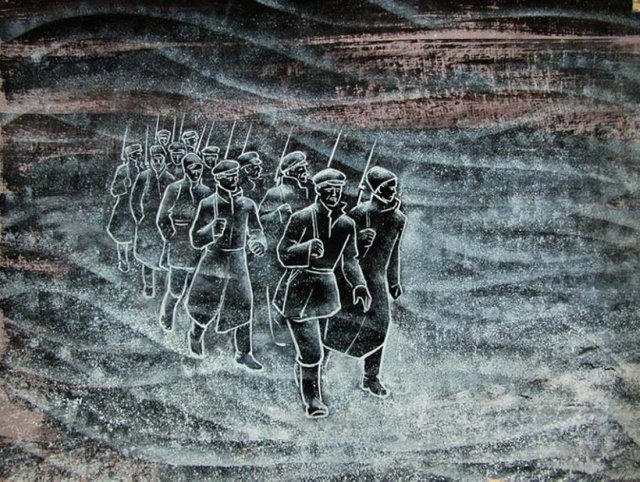
Conformist transmission is a mechanism for choosing a strategy for overcoming life's challenges.
The political process is an open non-equilibrium (dissipative) system, therefore it obeys the law "choice through fluctuations" of Ilya Prigogine.
There was another event in the life of society, requiring reaction and certain actions to adapt citizens to new conditions.
Immediately there are several heterogeneous streams to solve the problem and different groups begin to use them. The political system of order begins to shift towards Hausa, where different fluctuations (ways of solving the problem) begin to compete with each other fiercely, if this is, of course, a democratic country and citizens have freedom of choice.
All elements of the system - political actors begin to see each other. The clash of opinions on the solution of the political question leads to a collapse. At one point in time, the same political actor decides the question, joining one group, the experience gained can push him to another (third, fourth, and so on) side.
Varied streams grow, strengthen and grow at the expense of their supporters, there is a choice of a political system through all-all-all. One of the streams is gaining more strength by attracting a significant number of participants, it begins to dominate. And this way of solving the political problem takes step by step the whole political space.
At a certain time, a fracture occurs - this is the point of bifurcation, after it the entire political system changes: either degrades or becomes more complicated. Degradation generally occurs when political institutions are narrowed, and power is concentrated. And the complexity of the system is associated, as a rule, with the expansion of participants in political decision-making through inclusion, with the emergence of new institutions.
If you look at the political process from the point of view of history, there is practically no direct path to the emergence of inclusive institutions. Development goes, as a rule, with kickbacks back, through trial and error.
Developing countries seem to have an example and precise instructions for implementing inclusive institutional reforms, but for some reason they do not use ready-made recipes with rare exceptions. As a rule there is a painful and painful way of trial and error again, despite the examples of developed countries.
This is explained just by conformist transmission.
Let's assume that the elite, who have concentrated power and resources in their hands, hinder the implementation of reforms. But people respond to incentives. While dependence on elites works, they receive income and moral satisfaction from their position - the flow of conformism dominates, any changes are impossible.
As soon as a flock of black swans flies, and life changes, so there is a malfunction in the system and fluc- tuations begin. Someone buds through financial independence, someone has received their sight and the air of freedom starts to spin around and so on. These multiple flows begin to destroy the past political system, launching the search for a new self-organization of political life through a conformist transfer.
And now let's consider the reverse case. There was a split of the elites, there were several streams that were at war with each other, the choice began through a fluctuation. But the desire for change does not find broad support among the population and the choice is in favor of the existing political system.
But the mechanism of its break is already started because of multiple fluctuations and the point of fracture (bifurcation) inevitably leads not to the past state, but to the new, but necessarily with degradation. It is usually expressed in an even greater concentration of power and resources. What, in fact, is the launch of a bomb with a clockwork and this will necessarily lead to a social explosion after a while.
To such adventures democracy is most adaptive. Authoritarian countries and dictatorships dig their own graves: the conformist transmission works inexorably and requires a constant change of the system through adaptation.From this follows the obvious rule introduced by the ancient philosophers: a person becomes a citizen only through participation in the political process. As soon as he evades and / or delegates his choice right, as a rule to authority, so immediately the choice is made for him.
Man in this case loses not only his dignity, but step by step the choice for him leads to a gradual biting off of a piece of freedom.
Then the point of bifurcation, a person wakes up in a new reality, looks out the window, and there goes 12 Red Army men, a detachment of Schutz Stafeln, hungweipings or some other kind of attack ...
Thanks for the info
Posted using Partiko Android
Downvoting a post can decrease pending rewards and make it less visible. Common reasons:
Submit
bitte!
Downvoting a post can decrease pending rewards and make it less visible. Common reasons:
Submit
Democracy is inevitable solution to dicta regimes. Trial and error mechanism damages more to developing countries.
Downvoting a post can decrease pending rewards and make it less visible. Common reasons:
Submit
I agree! It is precisely the mechanism of adaptation to the challenges of life through a conformist transfer that gives clear advantages to democracies.
Downvoting a post can decrease pending rewards and make it less visible. Common reasons:
Submit
You got a 3.79% upvote from @postpromoter courtesy of @varja!
Want to promote your posts too? Check out the Steem Bot Tracker website for more info. If you would like to support the development of @postpromoter and the bot tracker please vote for @yabapmatt for witness!
Downvoting a post can decrease pending rewards and make it less visible. Common reasons:
Submit